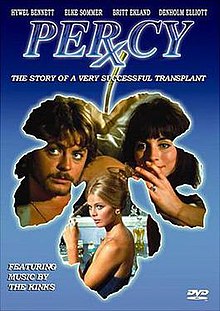Percy (film)
| Percy | |
|---|---|
 |
|
| Directed by | Ralph Thomas |
| Produced by |
Betty E. Box executive Nat Cohen |
| Written by | Hugh Leonard |
| Based on | novel by Raymond Hitchcock |
| Starring |
Hywel Bennett Denholm Elliott Elke Sommer Britt Ekland Cyd Hayman |
|
Production
company |
Welbeck Film Distributors
|
| Distributed by |
Anglo-EMI Films (UK) Metro-Goldwyn-Mayer (USA) |
|
Release date
|
1971 |
| Country | United Kingdom |
| Language | English |
| Budget | ₤300,000 |
Percy is a 1971 British comedy film directed by Ralph Thomas starring Hywel Bennett, Denholm Elliott, Elke Sommer and Britt Ekland.
The film is based on a novel of the same name by Raymond Hitchcock (father of musician Robyn Hitchcock), and is today remembered for its soundtrack by The Kinks. It was followed by a 1974 sequel, Percy's Progress.
Edwin (Bennett), an innocent and shy young man, is hit by a nude man falling from a high-rise building while carrying a chandelier. Edwin's penis is mutilated in the accident and has to be amputated; the falling man is killed.
Edwin becomes the recipient of the world's first penis transplant: he receives the very large penis of the womanizer killed in the same accident. With his new bit of anatomy (which he names "Percy"), Edwin follows the womanizer's footsteps, meeting all his women friends, before settling happily with the donor's mistreated widow.
Producer Betty E. Box discovered the novel when she and director Ralph Thomas were meeting a publisher about optioning the film rights for another book. They were not available at the time, but the publisher gave them a manuscript by Raymond Hitchcock about a penis transplant. Box took it back to the office to read. "I zipped through it, laughing aloud as I read," she wrote. "Very unusual. I might sometimes smile at a book, but I hadn't laughed like this since I read Richard Gordon's Doctor in the House."
Ralph Thomas enjoyed the book too so they decided to option the rights. These ended up costing four times more than Box originally thought after Hichcock had his own agent, as opposed to the publisher, do the negotiations. Box and Thomas paid for the rights themselves "not without a fair amount of heart-searching," Box wrote, "as we didn't expect it to be a straightforward financing operation - with the amount required to make a film it seldom is - but this was certainly not a subject I expected Rank, our traditional partners, to finance. They very soon turned it down without even reading it."
...
Wikipedia
